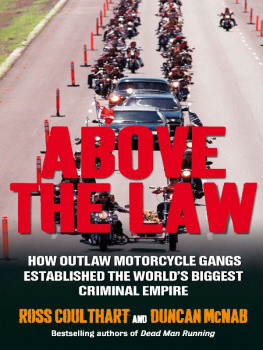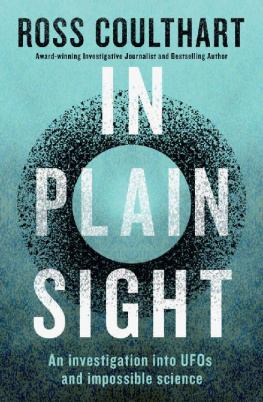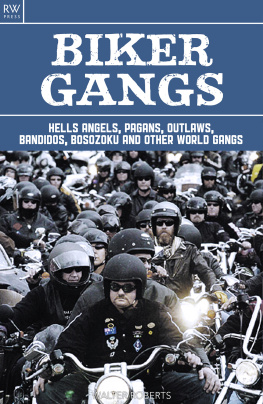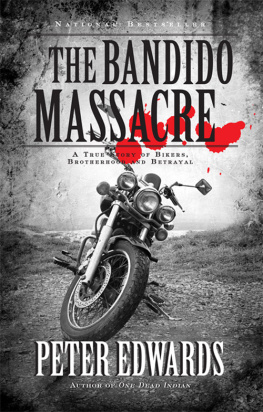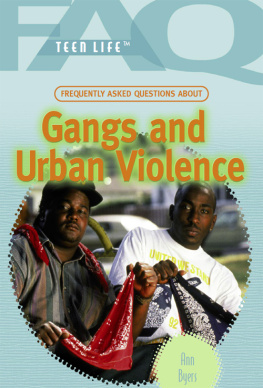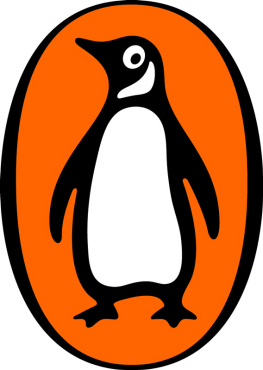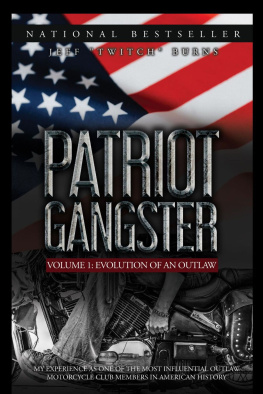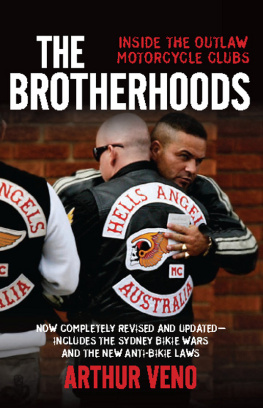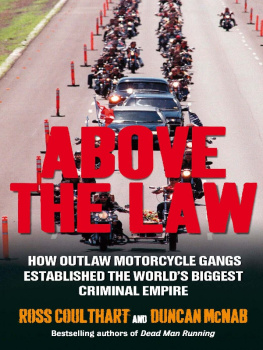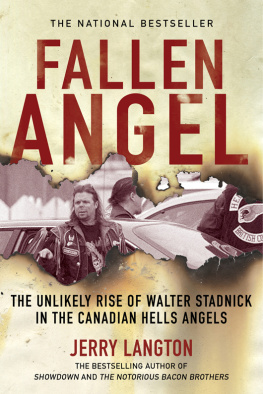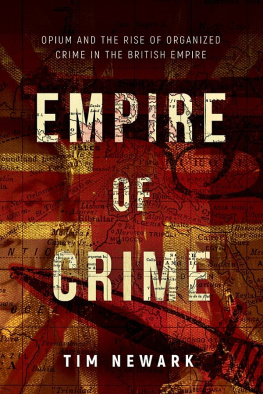Ross Coulthart is a Walkley Award-winning journalist. Duncan McNab is the author of The Usual Suspect: TheLife of Abe Saffron (Pan Macmillan 2005) and The Dodger:Inside the World of Roger Rogerson (Pan Macmillan 2006). He is also a journalist, and a former policeman and private investigator.
Ross Coulthart and Duncan McNab are the authors of the bestselling Dead Man Runningan insiders story of one of the worlds most feared motorcycle gangs, the Bandidos (Allen & Unwin 2008).
ABOVE
THE LAW

How outlaw motorcycle gangs
became the worlds biggest
criminal empire

ROSS COULTHART AND DUNCAN MCNAB

First published in 2010
This edition published in 2011
Copyright Ross Coulthart and Duncan McNab, 2010
All rights reserved. No part of this book may be reproduced or transmitted in any form or by any means, electronic or mechanical, including photocopying, recording or by any information storage and retrieval system, without prior permission in writing from the publisher. The Australian Copyright Act 1968 (the Act) allows a maximum of one chapter or 10 per cent of this book, whichever is the greater, to be photocopied by any educational institution for its educational purposes provided that the educational institution (or body that administers it) has given a remuneration notice to Copyright Agency Limited (CAL) under the Act.
Allen & Unwin
83 Alexander Street
Crows Nest NSW 2065
Australia
Phone: (61 2) 8425 0100
Fax: (61 2) 9906 2218
Email: info@allenandunwin.com
Web: www.allenandunwin.com
Cataloguing-in-Publication details are available
from the National Library of Australia
www.librariesaustralia.nla.gov.au
ISBN 978 1 74237 900 5
Typeset in 11.5/16 pt Bembo by Post Pre-press Group
Printed and bound in Australia by Griffin Press
10 9 8 7 6 5 4 3 2 1

Contents
It was the sound that many people there remembered best. It was an utterly extraordinary and terrifying noisea loud crunching soundas Hells Angel Anthony Zervas head was smashed open on a Sydney Airport terminal floor with a metal bollard.
The police statement tendered to the court in the wake of one of Australias most notorious bikie clashes reads like an episode from The Sopranos. On a peaceful Sunday afternoon in late March 2009, two feuding biker gangs, the Hells Angels and the Comancheros, waged a vicious and deadly public brawl right in front of hundreds of innocent folk going about normal airport business. What they witnessed was bestial and cruel. As police put it: One of these males was observed to strike [Zervas] on the ground to the head with a metal pole using significant force... blood was seen to flow from the head of the male on the ground.
There were hundreds of innocent onlookers that afternoonfamilies, children, foreign touristsand more than 300 are listed as witnesses for a committal hearing on murder charges which was scheduled to begin in July 2010. The guilt or innocence of those alleged to be responsible for Mr Zervas death will rightly be determined in the courts. But in the battle for public opinion, the mayhem at the Qantas Domestic Terminal that day cost the one-percenters, as outlaw bikers are known, the beginning of the end of the tolerance that many Australians and their politicians had for baffling reasons long extended to them... Perhaps. There is reason to be sceptical.
There are landfills now stuffed with the commentary written in the wake of the Sydney Airport brawl. Politicians made many promises about the steps they would now take to stamp out the scourge of biker violence. There was a lot of talk about how unprecedented and appalling this incident was; shock at how the fight broke out between the bikers with their brazen disregard for the millions of dollars spent on airport security and surveillance since 9/11. The politicians and police inevitably pledged they had never seen its like before and they would never tolerate it again. Truth is, the public has been given such bland assurances before, and that is what this book is largely aboutthe wilful blindness by all too many in law enforcement and politics to the unpleasant and inconvenient truth about one of the greatest international organised crime menaces today, the outlaw biker gangs.
As the old saying goes, those who forget their history are condemned to repeat it. For biker gangs in fact have a long and sordid history of flagrant and colourful disregard for airport security. Psychologists might suggest that such a public display of callousness is a territorial display not dissimilar to our canine friends very publicly marking their territory. For there have indeed been multiple biker-linked airport killings and attacks across the globe. As it happens, airports provide a convenient way of ensuring that someone you want to hurt or kill will be at a particular location at a particular time. And it certainly gets you noticed.
In March 1996, at Copenhagen Airport, the Hells Angels murdered the President of the Danish Bandidos, Uffe Larsen, also wounding three of his colleagues. In the same month, the Hells Angels also attacked another group of Bandidos in Norway, at Oslos Fornebu Airport, using automatic weapons. And just over a year before the Sydney brawl, in January 2008, Birmingham International Airport found itself the setting for another brutal clash between the Outlaws MC and the Hells Angels.
There is a tediously common theme to all these incidents. Sure, they all happened at airports and what that shows is just how little regard outlaw motorcycle gangs have for the threat of arrest by law enforcement. It also shows that when it comes to protecting the gang and its business, nothing else matters. The other common feature of every single airport incident is that, at their heart, they were all turf wars between the gangs. More often than not they are disputes over organised criminal activity by the rival gangs; one group stomping on another, perhaps taking out its leaders, because the rival gang is threatening earnings from drugs, extortion, illegal gambling or prostitution. What caused the Sydney clash is still for the courts to decide.
But there is one common bleat from the outlaw motorcycle gangs. Anytime one of these ghastly violent incidents occurs, bringing biker crime to public attention as it did in airports in Copenhagen, Oslo, Birmingham and Sydney, the gangs follow a well-rehearsed script.
First comes the claim that all this talk about outlaw motorcycle gangs being involved in organised crime is a hysterical police or media invention. Sure, they say, there are individuals in biker gangs who commit crimes just like there are crooks in the media and the legal profession. Then there is the claim that any move to crack down on the outlaw motorcycle gangs is the beginning of a Police State, a slippery slope of corroded civil liberties, with gays, grannies and any other minority group likely to fall victim if anyone threatens biker freedom. No one seems to see the irony in a 17-stone thug declaiming that outlaw motorcycle gangs are the thin end of the wedge.
Next page
